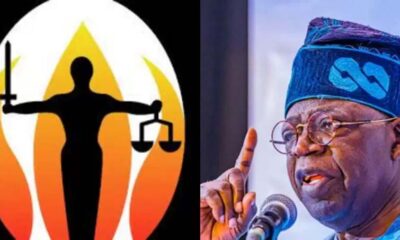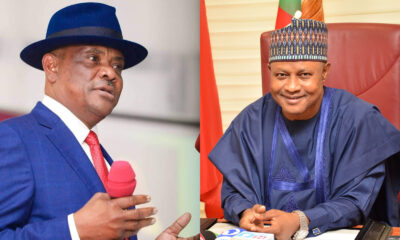News
SERAP sues Wike, 36 govs over N5.9tn, $4.6bn loans

SERAP sues Wike, 36 govs over N5.9tn, $4.6bn loans
Socio-Economic Rights and Accountability Project (SERAP) has filed a lawsuit against Nigeria’s governors and the Minister of the Federal Capital Territory, Abuja, Mr Nyesom Wike “over their failure to account for N5.9 trillion and $4.6 billion loans obtained by their states and the FCT, and to publish copies of the loan agreements, including details and locations of projects executed with the loans.”
The suit followed the disclosure last month by Governor Uba Sani of Kaduna State that the immediate past administration of Nasir El-Rufai left $587m, N85bn debt and 115 contractual liabilities, making it impossible for the state to pay salaries.
In the suit number FHC/ABJ/CS/592/2024 filed last Friday at the Federal High Court, Abuja, SERAP is asking the court to “direct and compel the governors and Mr Wike to account for N5.9trn and $4.6bn loans obtained by their states and the FCT and to publish copies of the loan agreements, location of projects executed with the loans.”
SERAP is also asking the court to “direct and compel the governors and Mr Wike to invite the Economic and Financial Crimes Commission (EFCC) and the Independent Corrupt Practices and Other Related Offences Commission (ICPC) to investigate the spending of all the loans obtained to date by their states and the FCT.”
In the suit, SERAP is arguing that “It is in the public interest to grant the reliefs sought. Nigerians have the right to see and scrutinise the loan agreements and know the details of how the domestic and external loans obtained by the governors and FCT minister are spent.”
According to SERAP, “Opacity in the spending of the loans obtained by the governors and Mr Wike would continue to have negative impacts on the fundamental interests of the citizens.”
SERAP is also arguing that, “Many states and the FCT are reportedly spending public funds which may include the loans obtained by them to fund unnecessary travels, buy exotic and bulletproof cars and generally fund the lavish lifestyles of politicians.”
READ ALSO:
- Chelsea thrash West Ham to stay on track for Europe
- Poor power supply: Your cup is full, IPOB tells Enugu DisCo
- Nigerian soldier accused of sleeping with colleague’s wife dismissed
SERAP is also arguing that, “Many states and the FCT are also allegedly mismanaging public funds which may include domestic and external loans obtained from bilateral and multilateral institutions and agencies.”
According to SERAP, “Many states and the FCT reportedly owe civil servants’ salaries and pensions. Several states are borrowing to pay salaries. Millions of Nigerians resident in the state and FCT continue to be denied access to basic public goods and services such as quality education and healthcare.”
According to SERAP, “Transparency in the spending of the loans obtained by the states and FCT is fundamental to increase accountability, prevent corruption, and build trust in democratic institutions with the ultimate aim of strengthening the rule of law.”
The suit filed on behalf of SERAP by its lawyers Kolawole Oluwadare, Kehinde Oyewumi and Ms Valentina Adegoke, read in part: “States and the FCT should be guided by transparency and accountability principles and proactively account for the loans obtained and publish copies of the loan agreements.”
“Widely publishing copies of the loan agreements and spending details of the loans obtained would ensure that persons with public responsibilities are answerable to the people for the performance of their duties in the management of public funds.”
“State governors and Mr Wike cannot hide under the excuse that the Freedom of Information Act is not applicable to their states and the FCT. The legal obligations to publish the information sought are also imposed by the provisions of the Nigerian Constitution and the African Charter on Human and Peoples’ Rights.”
“According to Nigeria’s Debt Management Office, the total public domestic debt portfolio for the country’s 36 states and the Federal Capital Territory is N5.9 trillion. The total public external debt portfolio is $4.6 billion.”
“The domestic and external loans obtained by the states and the FCT are vulnerable to corruption and mismanagement. The states and FCT have a responsibility to ensure transparency and accountability in how any loans obtained by the states and FCT are spent, to reduce vulnerability to corruption and mismanagement.”
“Directing and compelling the states and FCT to publish copies of the loan agreements would allow Nigerians to scrutinise them, and promote transparency and accountability on the spending of public funds including the loans obtained.”
READ ALSO:
- Just in: List of ex-governors under probe over N2.187tn fraud fabricated, says EFCC
- Nollywood veteran Shan George weeps as fraudster clears ₦3.6m from her account (VIDEO)
- Haaland four goals propel Man City to 5-1 victory against Wolves
“Providing and widely publishing the details of the spending of the domestic and external loans obtained by the states and FCT would enable Nigerians to effectively and meaningfully engage in the management of the loans.”
“The constitutional principle of democracy also provides a foundation for Nigerians’ right to know the details of loan agreements and how the loans obtained are spent. Citizens’ right to know promotes openness, transparency, and accountability that is in turn crucial for the country’s democratic order.”
“The effective operation of representative democracy depends on the people being able to scrutinize, discuss and contribute to government decision making, including on the spending of loans obtained by the states and FCT.”
“To do this, they need information to enable them to participate more effectively in the management of public funds by their state governments and the FCT.”
“The public interest in obtaining information about expenditures relating to the loans obtained by the states and FCT outweighs any privacy or other interest.”
“The oversight afforded by public access to such details would serve as an important check on the activities of the states and FCT and help to prevent abuses of the public trust.”
“There is a significant risk of mismanagement or diversion of funds linked to loans obtained by state governments and the FCT. The accounts of Nigeria’s 36 states and the FCT are generally not open to public scrutiny.”
“The Nigerian Constitution, human rights and anticorruption treaties to which Nigeria is a state party also impose obligations on the states and FCT to prevent mismanagement or diversion of public funds including the loans obtained.”
“Many years of allegations of corruption and mismanagement of public funds including the loans obtained by the states and FCT have contributed to widespread poverty, underdevelopment and lack of access to public goods and services.”
No date has been fixed for the hearing of the suit filed by SERAP.
SERAP sues Wike, 36 govs over N5.9tn, $4.6bn loans
News
INEC uncovers plan to disrupt Edo elections using ESSN operatives
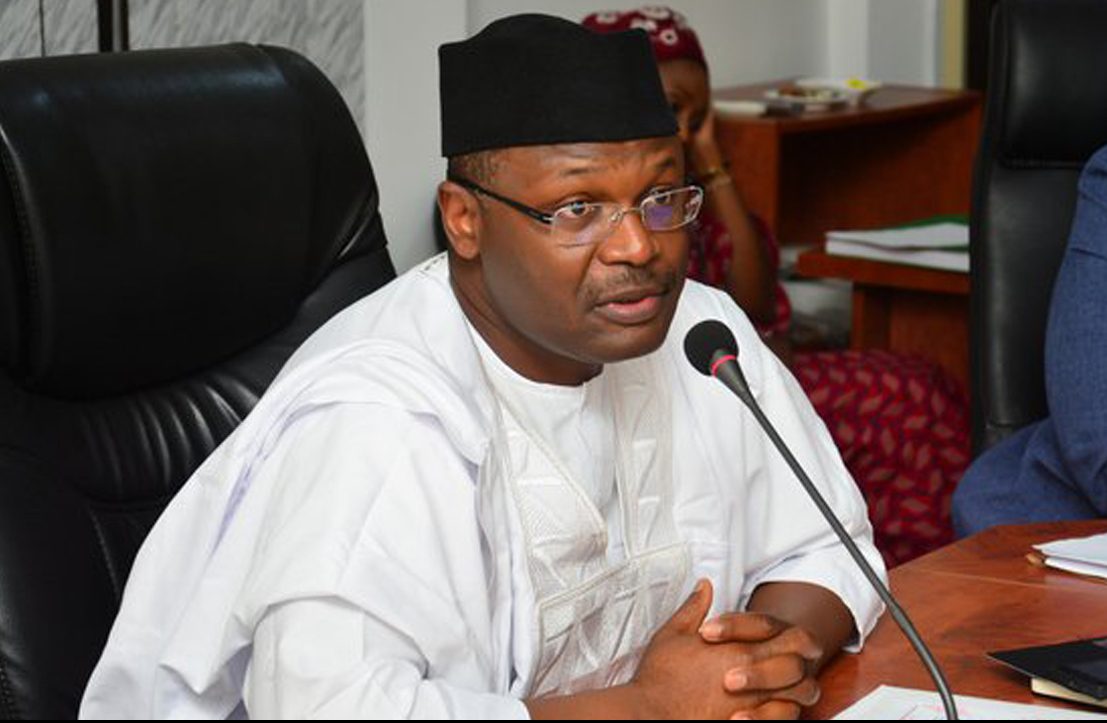
INEC uncovers plan to disrupt Edo elections using ESSN operatives
Chairman of the Independent National Electoral Commission (INEC), Prof. Mahmood Yakubu, has revealed plans to use members of the Edo State Security Network (ESSN) to disrupt the September 21 governorship elections.
He stated this on Thursday during his appearance before the National Assembly’s Joint Committee on Electoral Matters.
Prof. Yakubu also expressed worries about the security of lives and property during the upcoming off-cycle elections in Edo and Ondo states.
He noted not only the strain on state resources but also the issue of incumbency being exploited by governors to the disadvantage of opposition parties and their candidates.
Speaking specifically on Edo elections Prof. Yakubu said despite the challenge of flooding, there is also the issue of security.
READ ALSO:
- Muslims condemn Nancy Isime movie over use of hijab
- Again, Tinubu says govt won’t tolerate destructive protests
- NERDC Executive Secretary Prof Ismail Junaidu slumps, dies
He alleged that there was available information on the alleged deployment of operatives of the Edo State Security Network ESSN to curse commotion during the September 21 polls.
While outlining the activities for the two elections, the INEC boss said submission of all polling agents will be done 30 days before the respective elections.
He also said 17 candidates would be contesting the governorship position in both states with Edo fielding the only female candidate in the entire polls.
INEC uncovers plan to disrupt Edo elections using ESSN operatives
News
Again, Tinubu says govt won’t tolerate destructive protests

Again, Tinubu says govt won’t tolerate destructive protests
President Bola Tinubu emphasized the importance of balancing democratic freedoms with public safety on Thursday.
While acknowledging the right to peaceful protest, he made it clear that his administration will not permit demonstrations that escalate into violence, destruction, or harm to individuals or property.
This statement was made during a ceremony at the Presidential Villa in Abuja, where he received credentials from the newly appointed US Ambassador, Richard Mills Jr.
The President’s media adviser, Ajuri Ngelale, shared this exchange in a statement that underscored Tinubu’s commitment to preserving democratic norms and institutions.
Tinubu said this on the backdrop of growing calls for nationwide protests against economic hardship, scheduled for August 1, 2024.
The President said, “During the military era, we made our voices heard against dictatorship, and I was part of the group that engaged in peaceful protests without resorting to the destruction of property.
“We have worked hard to ensure 25 years of unbroken democracy and I will continue to maintain this democracy.”
He also described Nigeria-US relations as “rich,” committing to uphold democracy.
“Our relationship with America is rich. We believe in democracy and freedom. Some of your predecessors worked hard during our transition to democracy, and we remember the likes of Ambassador Howard Jeter.
READ ALSO:
- NERDC Executive Secretary Prof Ismail Junaidu slumps, dies
- MURIC demands ban on movie portraying women in Niqab as criminals
- BREAKING: Ohanaeze President General, Iwuanyanwu, dies at 82
“We look forward to Nigeria and the United States continuously working to expand cooperation on shared goals and democratic values,” he said.
Tinubu welcomed the U.S. State Department’s acknowledgement of Nigeria’s strategic role on the continent as Africa’s largest democracy, calling on the U.S. government to pay more attention to Africa.
He said, “Nigeria is ready to play its role as the largest democracy in Africa that is worthy of emulation to other African countries, but we need more U.S. partnership on the continent that is beneficial to both sides.
“We believe in freedom, and we are providing the leadership to make Nigeria’s economy grow.”
On his part, Mills affirmed the U.S. support for Nigeria’s democracy and pledged support for bigger roles for Nigeria in the international arena.
“Nigeria is crucial to the United States because we share democratic values, and we are ready to give you all the support.
“I am here to make sure that the relationship blossoms both on democracy and the economic side,” Mills said.
The Ambassador also expressed the United States’ commitment to expanding cooperation with Nigeria on cybercrimes, announcing the establishment of a special office at the Embassy to work closely with the Economic and Financial Crimes Commission.
Earlier, President Tinubu also received Letters of Credence from the High Commissioner of Malaysia to Nigeria, Aiyub Bin Omar, and the High Commissioner of Botswana, Ms. Phild Nani Kereng.
He told the High Commissioner of Malaysia that Nigeria would work towards improving the balance of trade between the two countries.
“Diversification of the economy is uppermost on my Renewed Hope Agenda for Nigeria.
“We must look at how we can improve the balance of trade with Malaysia,” the President said.
Tinubu also acknowledged that many Nigerian students find studying in Malaysia attractive, adding that Nigeria looks forward to their contributions to the development of critical sectors of the economy, such as agriculture and ICT.
The Malaysian High Commissioner said that ahead of the 50th anniversary of the establishment of bilateral relations in 2025, Malaysia is looking forward to strengthening relations with Nigeria.
READ ALSO:
- Customs impound seven containers of hard drugs in Rivers
- 30-year-old fake soldier arrested in Bauchi
- Wike dares protest organisers, says August 1 not available in Abuja
“We are pleased with our cooperation in the areas of education. We are also keen on working with Nigerian partners in the financial services sector,” the High Commissioner said.
In his audience with the Botswana High Commissioner, the President expressed Nigeria’s readiness to develop robust cultural and economic cooperation with the Southern African country.
Acknowledging Botswana’s progress on livestock development, the President said he had received a briefing from a committee established to create a ministry of livestock development in Nigeria.
“The committee is at work, and their report will be ready in the next two weeks. Africa’s solution is in our hands. Nobody will help us if we do not help ourselves,” Tinubu said.
He described President Mokgweetsi Masisi of Botswana as a good friend and extended his appreciation to the Botswana President for attending his inauguration.
Kereng said Botswana is committed to being a leader in the production of livestock vaccines and is prepared to partner with Nigeria in this area.
She expressed admiration for Nigerian arts, entertainment, and culture, adding that young people from Botswana had a lot to learn from Nigeria’s youth-driven creative economy.
“My coming to Nigeria fulfils my President’s vision of improved relations with Nigeria, and I will work very hard to achieve these objectives,” said Kereng.
The protests, organised under the hashtag ‘#EndBadGovernancein Nigeria,’ have gained significant traction on social media, with no group officially claiming responsibility.
Again, Tinubu says govt won’t tolerate destructive protests
News
MURIC demands ban on movie portraying women in Niqab as criminals
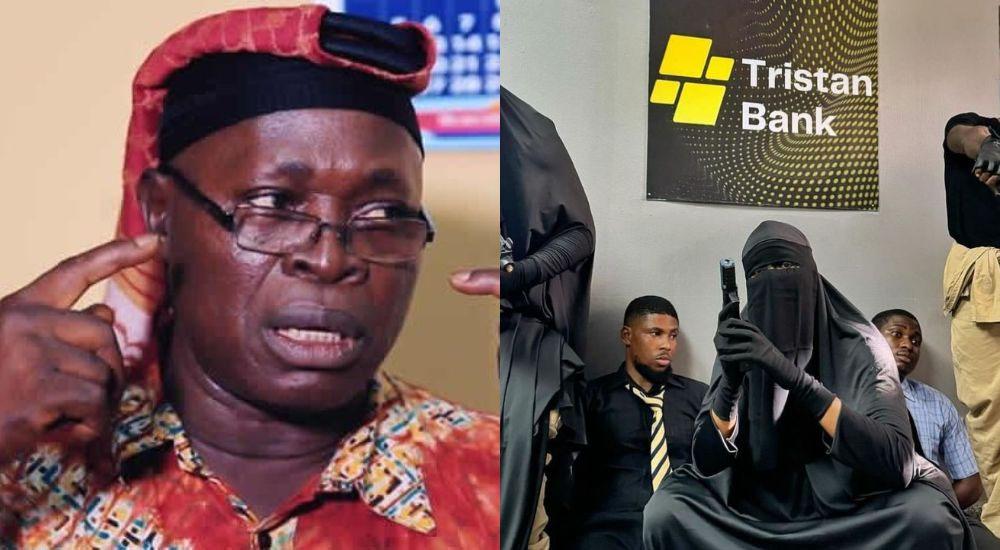
MURIC demands ban on movie portraying women in Niqab as criminals
The Muslim Rights Concern (MURIC) has condemned an upcoming movie featuring Nancy Isime and other actresses wearing purdah (Niqab) and brandishing weapons, describing it as “satanic” and “Islamophobic.”
The group claims the film portrays Muslim women as criminals and incites the public against them.
The statement read: “An extremely anti-Muslim film has been released into the Nigerian movie industry. The upcoming film, which was recently unveiled by Nancy Isime, shows women in purdah brandishing dangerous weapons and robbing banks. It is Islamophobia taken to the highest level. This film is satanic, repugnant, and provocative.
“It is aimed at portraying Muslim women as criminals with a violent proclivity. The film is capable of inciting the public against Muslim women. It may also expose Muslims in general to public ridicule and opprobrium.
“We believe that the film is the handiwork of Muslim-haters and part of the plot to stop Muslim women from wearing hijab and niqab. The plot was hatched a long time ago, and its execution began in the schools. This plot was boldly and diligently confronted in Nigerian courts by Muslims until the highest court in the land made a pronouncement on it. This Satanic film is the latest effort in the war against hijab”.
MURIC’s Executive Director, Professor Ishaq Akintola, called for the National Film and Video Censors Board to investigate and ban the movie, warning that it could spark violence and ridicule against Muslims.
“To Nigerian Muslims who have inundated our communication channels with video clips, voice notes, and other types of messages, we have this to say: please remain calm and peaceful. You have spoken loud and clear.
READ ALSO:
- BREAKING: Ohanaeze President General, Iwuanyanwu, dies at 82
- Customs impound seven containers of hard drugs in Rivers
- 30-year-old fake soldier arrested in Bauchi
“We have received your messages and action is being taken right now. Our religion brought a message of hope and peace to the world. We will not allow anyone to paint our women, our mothers, our wives, our daughters and sisters in the colours of Shaytan. Be good ambassadors of Islam. Don’t take the law into your hands. Allow the authorities to take necessary action,” he added.
The movie poster sparked outrage among the Muslim community, with many expressing offense at the depiction of women wearing hijab and face veils in a bank robbery scene.
Some have threatened to file a complaint with Meta, seeking action against the account responsible for sharing the “Islamophobic content.”
Reacting, one Latifat Adewunmi Jumah, with a Facebook handle, Laj Fingers, expressed her dissatisfaction over the offensive posts, saying, “The niqab/hijab is not an armed robbery attire! The niqab/hijab is not an attire for concealing identity. If you needed to conceal your identity for a perfect robbery role, you could have used a nose mask or wear a mask. Why wear Islamic attire? I find this offensive. Something needs to be done to stop these people. Niqab/Hijab is not a costume, neither is it a joke”.
Another Facebook user, who identified as Alfa Shehu, commented, “And one of our brothers from Ilorin is kuku in the movie with them. Hypocrites! It is these same people who will turn around tomorrow and say women in Niqab are doing this and doing that. Awon alarun opolo gbogbo. Anything for clouts and monetisation.”
MURIC demands ban on movie portraying women in Niqab as criminals
-
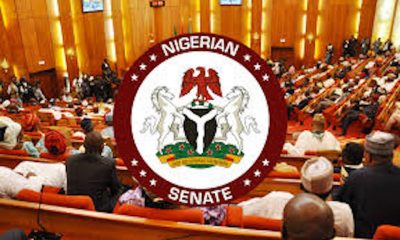
 News3 days ago
News3 days agoBREAKING: Senate passes minimum wage bill within an hour
-

 Business3 days ago
Business3 days agoDangote refinery Vs NMDPRA: Petroleum Minister Lokpobiri intervenes, meets Aliko, Ahmed, NNPCL head
-

 News3 days ago
News3 days agoJUST IN: Reps call for suspension of NMDPRA CEO pending investigation
-

 News2 days ago
News2 days agoNLC can’t withdraw from protest it didn’t organise – Ajaero
-

 News3 days ago
News3 days agoBREAKING: Tinubu Sends ₦70,000 Minimum Wage Bill To National Assembly
-

 News2 days ago
News2 days agoNorthern group attacks Reps Minority Caucus for demanding Nnamdi Kanu release
-
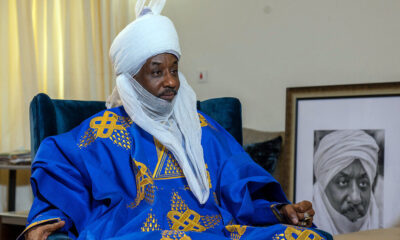
 News3 days ago
News3 days agoWhy some people in NNPC are sabotaging Dangote refinery – Emir Sanusi
-

 International3 days ago
International3 days agoDozens killed as Palestinians flee Israel’s new offensive on Khan Younis



